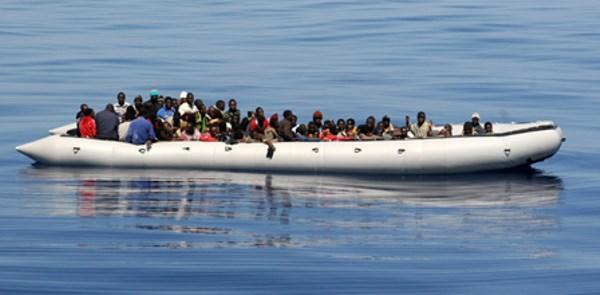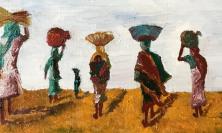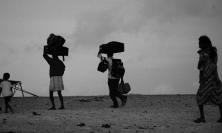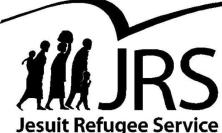The repeated tragedy of migrants drowning in the Mediterranean Sea, ‘conjures up an eerie spectre of the transatlantic slave trade’, says Nigerian Jesuit Agbonkhianmeghe E. Orobator. The revulsion with which we now react to the slave trade should also apply to this modern-day crisis, and must inform our thinking and action in response to it.
Once upon a time, millions of Africans were shipped across the Atlantic Ocean on an infamous journey to North America and South American European colonies to work as slaves. To this day, accounts of the atrocious conditions of the slaves on European-owned ships and in plantations in the so-called New World still provoke revulsion. Estimates vary, but a reliable guess is that up to two million of the men, women and children that made up the human cargo never made it to their destination. They perished at sea.
The alarming and increasing death toll of migrants crammed into unseaworthy vessels that drown in the Mediterranean conjures up an eerie spectre of that transatlantic slave trade. Then, the massive illegal trade in human beings was sustained by a convergence of situations and conditions, actors and agents, and the complicity of governments, locally and globally. Similar forces lie behind today’s desperate attempts by hapless men, women and children to cross the Sahara Desert and the Mediterranean Sea to get to Europe.
The young men and women who gather their meagre resources to embark on this journey are not oblivious to the perils that lie in wait. They have calculated the risks and reckoned with the odds. They know that their chances are extremely slim – if they don’t die and rot in the Sahara or drown in the Mediterranean, they may be lucky enough to set foot on the promised land of Europe. The majority are brutalised by criminal gangs and harassed by corrupt security agents along the way. Yet, listening to the stories of survivors and prospective migrants, they remain unfazed by the dangers that dog the migrant trails and resolute in their determination never to turn back. An African proverb is apt here: when a rat deliberately runs into a fire, know that it is being pursued by something hotter than fire.
The countries that thousands of Africans are fleeing are routinely classified by experts and analysts as shining examples of the fastest growing economies in the world. But, clearly, such statistical depictions of the fortunes of Africa cannot be telling the whole story. The perilous voyages across the Mediterranean are triggered by political instability, violent conflicts, social inequality and economic disempowerment in the countries of origin; a sophisticated, well-resourced and multi-level network of criminal gangs practicing people trafficking; and moral apathy and political lethargy of destination countries.
African leaders are not doing enough to deal with this problem. More can and should be done to slow down, if not halt, the migrant flows by improving living conditions and prospects of a better life, especially for the young. The requisite measures are not impossible, nor are they even too complicated to put in place: better educational opportunities, gainful employment, job creation, resources for entrepreneurship, and resolving violent civil and political conflicts – as well as arresting and prosecuting known people traffickers.
Last week’s tragedy is by no means the first time that we have witnessed the mass death of migrants on the Mediterranean. In 2013, when more than 100 African migrants met a similar fate off the coast of the island of Lampedusa, stirring promises to avert a repeat of such preventable carnage echoed around the world. European Union leaders made familiar noises and shed tears over the ‘terrible human tragedy’ and ‘slaughter of innocents’ at sea. Pope Francis called it a disgrace and urged concerted efforts to ensure that ‘tragedies like this don’t happen again’; leaders from the UN, the EU and the African Union concurred. The African Union embarked on the now-moribund and poorly resourced ‘Horn of Africa Initiative’ to discourage migration by creating favourable conditions of living in the countries of the migrants’ origin.
Sadly, since Lampedusa, the promised actions have failed to yield the desired results, or even to materialise. Meanwhile, apathy and amnesia settled in. A state of lawlessness in Libya created an ideal haven for gangs engaged in the lucrative business of people trafficking – the ‘slave traders of the 21st century,’ in the words of Italian Prime Minister Matteo Renzi. The EU cut back on its maritime search-and-rescue operation ostensibly because it was unaffordable and, bizarrely, with the stated intention of deterring would-be migrants. Worse still, xenophobia filtered into mainstream politics as far-right, anti-immigration nationalist movements gained respectability and acceptability among European voters.
The frustration and apprehension of some European countries on the Mediterranean are understandable. Hospitality is never an easy virtue to practise, especially when wave after wave of guests arrive on the doorsteps of ill-prepared hosts; it is harder still when there is no way of telling how many more migrants are on the way. European policy-makers, governments and non-governmental organisations can bicker ad nauseam about whether or not these are genuine refugees, asylum seekers or economic migrants, but they cannot overlook their common identity. In the words of Pope Francis: ‘They are men and women like us, our brothers and sisters who seek a better life; hungry, persecuted, injured, exploited, victims of war – they seek a better life. They were seeking happiness.’ In reality, these migrants of the Mediterranean confront the world with a matter of human dignity, equality and justice. It is a question of ethics as much as economics and politics.
Now, as in the time of the slave trade, the cries of drowning migrants and the stench of death from the bottom of the Mediterranean are haunting our collective conscience and rousing us from a self-imposed moral somnolence. There is a moral imperative to save lives and it lies on the doorsteps of the European Union and in the backyard of the African Union. For the former, their responsibilities include a greater sharing of the burden of hospitality to migrants, a commitment to venture further out into the Mediterranean to save sinking, overcrowded boats, and a tempering of harsh immigration laws with mercy and compassion. The African Union must call to account dysfunctional African countries that create conditions for this mass flight of young women, men and children in search of the proverbial greener pastures.
The shameful transatlantic slave trade was ended by a massive convergence of unrelenting international efforts, campaigns and struggles on several fronts. Nothing short of the same is required to deal with the modern-day twin crises of migration and people-trafficking that are turning the Mediterranean into a mass grave. Pope Francis is right: ‘Only a decisive collaboration of everyone can help and prevent them.’ Words are not enough.
Agbonkhianmeghe E. Orobator SJ, a Nigerian Jesuit priest, is the Principal of Hekima University College in Nairobi, Kenya.






